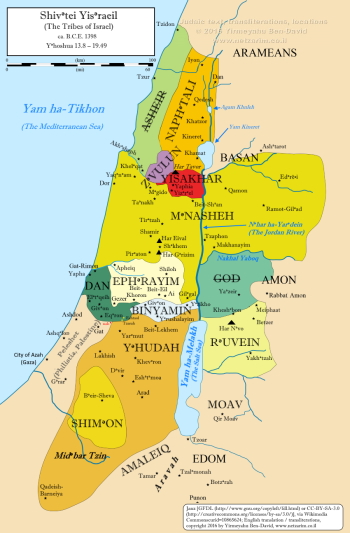
 |

 |
Barren for years, and taunted all the while by her husband’s other wife who had children, KhanꞋâh vowed that, if é‑‑ä would enable her to conceive and give birth to a son, she would dedicate that son to be a lifelong Nâ•zirꞋ.
Year after year, KhanꞋâh journeyed to the Mi•shᵊkânꞋ of Israel at Shil•ōhꞋ weeping, fasting and praying for a son.
One year, ĀlꞋi![]() ha-Kō•heinꞋ ha-Jâ•dōlꞋ spotted her weeping and praying silently (though her lips were moving), vowing: “If you will allow your handmaid a mortal male-seed, I will give him to é‑‑ä. For all the days of his life, no mōr•âhꞋ would ascend over his rōsh.”
ha-Kō•heinꞋ ha-Jâ•dōlꞋ spotted her weeping and praying silently (though her lips were moving), vowing: “If you will allow your handmaid a mortal male-seed, I will give him to é‑‑ä. For all the days of his life, no mōr•âhꞋ would ascend over his rōsh.”
Seeing her lips moving without speaking aloud, ĀlꞋi assumed she had drunk too much wine during the Khag and was hallucinating. So he rebuked her.
When KhanꞋâh explained that she was sober but despondent and pouring-out her nëphꞋësh before é‑‑ä, ĀlꞋi replied, “May Ël•ōh•eiꞋ Yi•sᵊr•â•eilꞋ grant your request.”
After a period of time, KhanꞋâh did, indeed, become pregnant and gave birth to a son, whom she named Shᵊmu•eilꞋ, an anagram![]() for “Mei-é‑‑ä shᵊilꞋᵊti•v”. True to her vow, when she had weaned her son, she took him to live in the Mi•shᵊkânꞋ in Shil•ōhꞋ, with ĀlꞋi ha-Kō•heinꞋ ha-Jâ•dōlꞋ.
for “Mei-é‑‑ä shᵊilꞋᵊti•v”. True to her vow, when she had weaned her son, she took him to live in the Mi•shᵊkânꞋ in Shil•ōhꞋ, with ĀlꞋi ha-Kō•heinꞋ ha-Jâ•dōlꞋ.
As a youth, wearing a linen ei•phōdꞋ and a mᵊil that KhanꞋâh had made for him, Shᵊmu•eilꞋ ministered to é‑‑ä in accordance with ĀlꞋi’s counsel.

|
In the days prior to becoming enslaved by the Pᵊli•shᵊt•inꞋ — while the A•rōnꞋ ha-QōꞋdësh and the neir of the Mᵊnōr•âhꞋ still remained in the Mi•shᵊkânꞋ in the Israeli Capital of Shil•ōhꞋ where Yᵊho•shuꞋa Bin-Nun had placed it — the DᵊvarꞋ é‑‑ä had already subsided to the point that it had become a rare-treasure. There was no longer any break-through magnitude of vision. Precluding any solution, ĀlꞋi was old, bedridden and nearly blind.
One night, before the neir of the Mᵊnōr•âhꞋ had burned out for the night, Shᵊmu•eilꞋ fell asleep in the Hei•khâlꞋ é‑‑ä in which the A•rōnꞋ Ël•ōh•imꞋ resided.
Shᵊmu•eilꞋ perceived é‑‑ä![]() calling him.
calling him.
“äÄðÌÅðÄé!”, Shᵊmu•eilꞋ replied, running to ĀlꞋi in response. “äÄðÌÅðÄé! What do you need?”
“I didn’t call you,” ĀlꞋi replied. “Go back to sleep!” So Shᵊmu•eilꞋ went back to sleep.
Then Shᵊmu•eilꞋ again perceived é‑‑ä calling him a second time.
And a second time, Shᵊmu•eilꞋ ran to ĀlꞋi in response. “äÄðÌÅðÄé! What do you need?”
“I didn’t call you,” ĀlꞋi replied. “Go back to sleep!” So Shᵊmu•eilꞋ went back to sleep.
Now this was prior to Shᵊmu•eilꞋ knowing![]() é‑‑ä; i.e. prior to DᵊvarꞋ é‑‑ä being revealed to him.
é‑‑ä; i.e. prior to DᵊvarꞋ é‑‑ä being revealed to him.
Yet again, Shᵊmu•eilꞋ perceived é‑‑ä calling him a third time.
And a third time, Shᵊmu•eilꞋ ran to ĀlꞋi in response. “äÄðÌÅðÄé! What do you need?”
But this time, finally, ĀlꞋi understood![]() that é‑‑ä was calling the youth. So this time, ĀlꞋi told Shᵊmu•eilꞋ to go back to sleep and, if he perceived the call again, to reply: “ãÌÇáÌÅø é‑‑ä, ëÌÄé ùÑÉîÅòÇ òÇáÀãÌÆêÈ!”
that é‑‑ä was calling the youth. So this time, ĀlꞋi told Shᵊmu•eilꞋ to go back to sleep and, if he perceived the call again, to reply: “ãÌÇáÌÅø é‑‑ä, ëÌÄé ùÑÉîÅòÇ òÇáÀãÌÆêÈ!”
So Shᵊmu•eilꞋ returned to his bed.
This time, Shᵊmu•eilꞋ perceived é‑‑ä coming and positioning Himself near him, calling like He had before: “Shᵊmu•eilꞋ? Shᵊmu•eilꞋ!”
But this time, Shᵊmu•eilꞋ answered the call: “ãÌÇáÌÅø é‑‑ä, ëÌÄé ùÑÉîÅòÇ òÇáÀãÌÆêÈ!”
Then é‑‑ä revealed to Shᵊmu•eilꞋ what He was going to do. So Shᵊmu•eilꞋ grew up, and é‑‑ä was with him, and not one of His DᵊvarꞋ fell to the ground unfulfilled. Consequently, everyone in Yi•sᵊr•â•eilꞋ, from Dân to Bᵊeir ShëvꞋa knew that Shᵊmu•eilꞋ was believed to be a Nâ•viꞋ belonging to é‑‑ä.

Optional parental preparation:
The Calling — A calling of é‑‑ä is broadcast in a spiritual (i.e. non-physical) mode; a non-physical vision (impossibly contradictory to occur in the physical world) for all who are committed to hearken and attenuate themselves to perceive it. ![]()
What does it mean to be taunted? (A good opportunity to adroitly learn if your child has suffered from being taunted; or, perhaps, taunts others.)
What does it mean to vow?
What does wean mean?
What is vision? A vision? What does it mean for a leader to have vision?
What does it mean to be called? What is one’s calling? How does one determine one’s calling in life?
Questions you might anticipate that your child might raise and be prepared to discuss:
What does barren mean?
What does the verb wane mean?
What does subside mean?
What is a capital city?
What does preclude mean?
What is a magnitude?
![]()
 |
 |